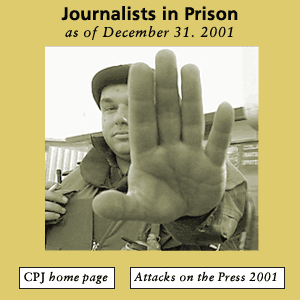Attacks on the Press 2002: Kuwait
Kuwait’s press has long been recognized as the most liberal in the Persian Gulf. Kuwaiti newspapers, all of which are privately owned, are known for outspoken and critical coverage of the government and its policies. Nonetheless, the country’s press laws prohibit “subjecting the person of the emir to criticism” and empower authorities to suspend newspapers…
French journalist dies after tank accident
New York, December 23, 2002—The Committee to Protect Journalists (CPJ) mourns the death of French television reporter Patrick Bourrat, who was killed in an accident while covering U.S. military exercises in northern Kuwait. Bourrat, a veteran 50-year-old reporter with France’s TF1, died yesterday of injuries sustained on December 21, 2002 when he was struck by…
Al-Jazeera bureau closed
New York, November 4, 2002—The Committee to Protect Journalists (CPJ) condemns yesterday’s decision by Kuwaiti authorities to suspend Al-Jazeera’s Kuwait bureau. Saad al-Enezi, the Al-Jazeera bureau chief in Kuwait, told CPJ he received a telephone call from the Ministry of Information yesterday informing him of the Kuwaiti government’s decision. He said that no specific reason…
Attacks on the Press 2001: Middle East Analysis
Bucking a worldwide trend toward democracy in the post-Cold War era, the political landscape of the Middle East and North Africa remained dominated by an assortment of military-backed regimes, police states, autocracies, and oligarchies. A new, younger generation of leaders has emerged in some countries in recent years, inheriting power and bringing hope for political…
Attacks on the Press 2001: Kuwait
Kuwait’s press remains one of the more open in the Arab world. Newspapers often cover local political affairs aggressively and are not shy about criticizing senior officials. Nevertheless, journalists still practice self-censorship and avoid taking on the emir and other members of the ruling family.

Attacks on the Press 2001: Journalists in Prison
There were 118 journalists in prison around the world at the end of 2001 who were jailed for practicing their profession. The number is up significantly from the previous year, when 81 journalists were in jail, and represents a return to the level of 1998, when 118 were also imprisoned.
Editor murderered
New York, March 21, 2001 — In a letter sent today to Kuwaiti ruler Sheikh Jaber al-Ahmed al-Sabah, CPJ expressed alarm about the murder of editor Hidaya Sultan al-Salem, owner and editor of the weekly magazine Al-Majales. While a motive for this killing has not yet been established, we fear that al-Salem may have been…
Attacks on the Press 2000: Middle East and North Africa Analysis
ALTHOUGH RIGHTS TO FREE EXPRESSION AND PRESS FREEDOM are enshrined in national constitutions from Algeria to Yemen, governments found many practical ways to restrict these freedoms. State ownership of the media, censorship, legal harassment, intimidation, and imprisonment of journalists were again among the favored tools of repression and control. In Iraq, Libya, Saudi Arabia, Syria,…